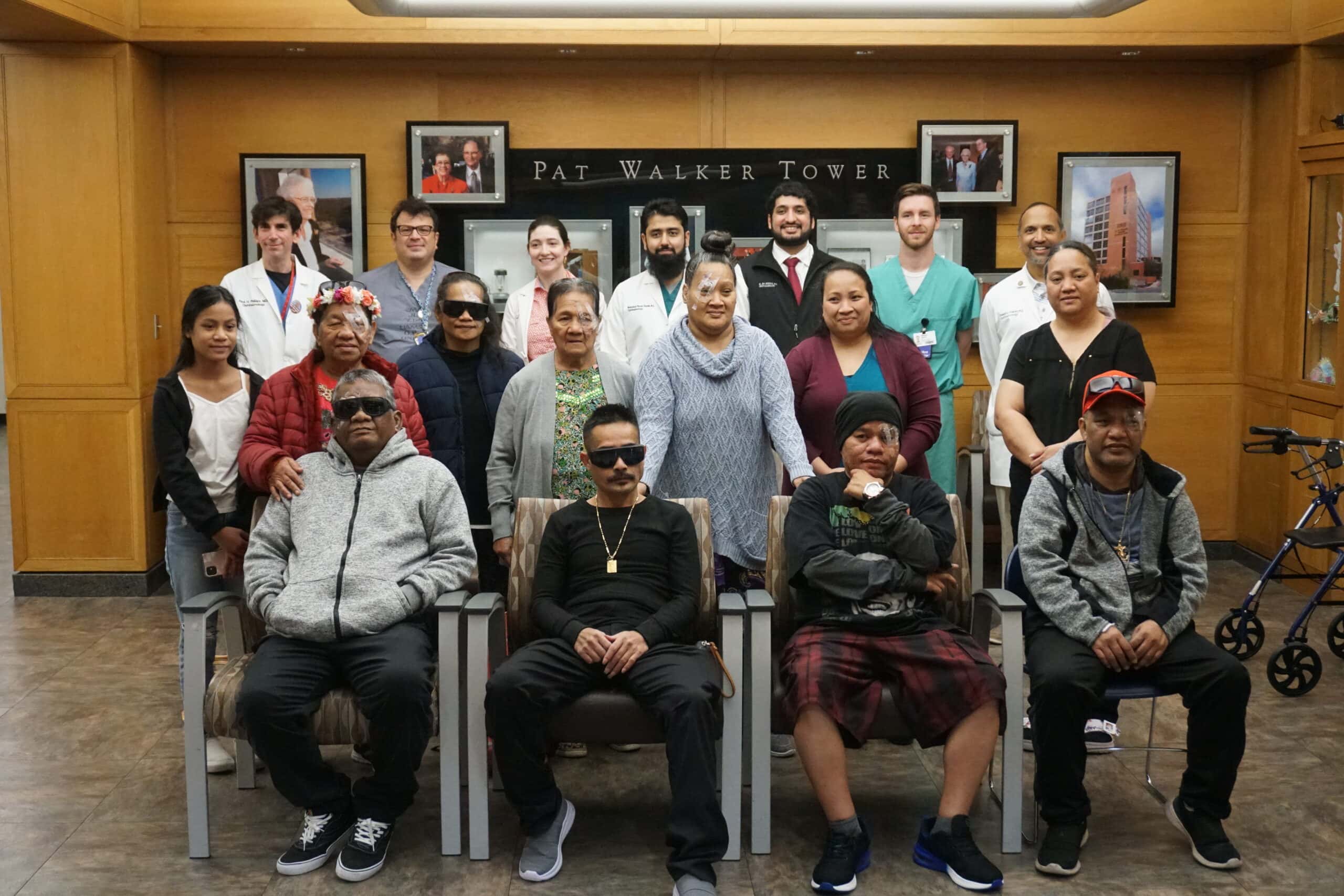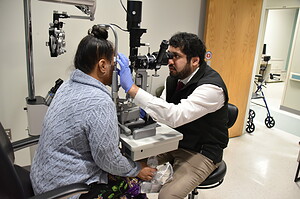View Larger Image

Eight Pacific Islander patients and their families pose with UAMS staff and Jones Eye Institute doctors after a successful round of cataract surgeries.
Image by Benjamin Waldrum
Seeing is Believing: Jones Eye Institute Restores Pacific Islanders’ Sight
| Cataracts had made life so difficult for Joshua Roby, 43, of Springdale that he could not write up reports at his security job, and he needed help walking around. Less than a day after cataract surgery, he says his vision is “much, much better,” and he can move well on his own.

Joshua Roby (at right) had to be led around by the hand before his cataract surgery. Now, he can see and move freely on his own.Ben Boulden
Eight patients from Northwest Arkansas, including natives of the Marshall Islands and the Federated States of Micronesia, received cataract surgeries April 14 as part of the UAMS Harvey & Bernice Jones Eye Institute’s fourth “Gift of Sight” event since 2021. Surgeries, transportation and food were provided at no cost to the patients, thanks to a fund created by generous Eye Institute donors. Many of the patients also were covered by Medicaid.
Northwest Arkansas is home to the largest Marshallese population in the continental United States after many citizens from the Marshall Islands migrated to the U.S., beginning in the 1950s. Their legal migration occurred after the U.S. detonated more than 65 nuclear test bombs that destroyed some of their islands and ecosystems. Neighboring Micronesia is a small system of islands in the same region of the world. Both are sovereign nations.
On Saturday, April 15, patients were able to see again for the first time in years. For Roby, a Micronesia native who moved to Springdale as a child, it was a welcome relief.
“It’s been really hard for me to make reports [at my job], and I couldn’t check in drivers who needed to drop off their loads,” Roby said. “I couldn’t even make my way down to use the restroom because I could not see anything.”
A cataract causes the lens of an eye to become cloudy, leading to vision issues or blindness. Cataract surgery removes the cloudy lens and usually replaces it with a clear, artificial lens. The surgery typically takes less than 30 minutes but costs thousands of dollars without insurance.

Resident Zia Siddiqui, M.D., examines patient Philomena Andrew following her cataract surgery.Ben Boulden
“This is the fourth group of Marshallese patients that we were able to do surgeries for and make blind people see,” said Paul Phillips, M.D., director of the Eye Institute. “It is truly a team effort involving doctors, staff and administrators, and I am proud of all who enable this to happen.”
UAMS provided transportation from Northwest Arkansas to Little Rock for the patients, who arrived April 14 for preoperative exams, followed by cataract surgery. They stayed overnight at provided accommodations before returning the next morning for postoperative exams.
The group of eight is now part of dozens of patients who have received the “Gift of Sight.” For some, like Roby, there will be follow-up surgeries to remove cataracts in the other eye.
“I want to say thank you to the doctors and employees who helped me,” Roby said. “Thanks to God, too — because God gave them a gift and talents so they can help people. I do appreciate what they’ve done for me.”
After the postoperative exams were complete, patients and their family members gathered to thank institute staff by singing songs as they clapped to the rhythm. One song was called “Arigato,” said translator Terry Takamaru, which is the Japanese word for “thank you.”
Alongside Phillips, the event was organized by Takamaru and Shelli Madison.
A team composed of Carina Sanvicente, M.D., Joseph Chacko, M.D., Ahmed Sallam, M.D., Ph.D., and residents Muhammad Shamim, M.D., Zia Siddiqui, M.D., William Henry, M.D., and Aric Clegg, M.D., helped identify patients, led the preoperative and postoperative exams, and performed the surgeries.
“Surgeries for thicker cataracts like these are definitely more difficult than an average cataract surgery,” Sanvicente said. “It usually requires more steps and more energy, but we’re definitely able to do it. It’s very rewarding to help people see, and we’re always happy and eager to help.”
“The experience was great,” said Shamim, who performed Roby’s surgery. “We don’t always see these types of cataract cases. But it’s these kinds of patients that remind us why we do what we do. I feel very fortunate to be able to participate in this.”